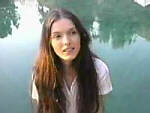| Jocelyn Montgomery with David Lynch |
| Lux Vivens: The Music of Hildegard von Bingen |
 Abbess of the Abyss Abbess of the Abyss
Jocelyn Montgomery and David Lynch bring a Benedictine mystic's music to life.
by John Diliberto The year 1998 marks the 900th anniversary of the birth of Abbess Hildegard von Bingen. The 12th-century nun was a mystic, a scientist, a healer, and in her spare time between religious visions, a writer of nearly 100 chants and hymns. Hildegard's music soared in a way you'd rarely find with Gregorian chants. Sung by women, the chants exuded a melodic fervor and pristine beauty that elevated them from the solemn to the divine. Many artists have adapted the music of Abbess Hildegard to a more contemporary sound, but none have approached her from the perspective of David Lynch. He's best known for his films Eraserhead, Elephant Man, Blue Velvet, and the television series Twin Peaks. On the album Lux Vivens, he creates haunting arrangements around the performance of singer Jocelyn Montgomery. While most interpreters have the Abbess singing at the gates of heaven, Lynch turns her into the Abbess of the Abyss, singing at the gates of oblivion. "Oblivion? No, no, it's not oblivion," Lynch protests. Sitting in his bare, concrete office in the Hollywood Hills, the director responsible for the industrial surrealism of Eraserhead and the twisted psychodrama of Blue Velvet seems surprised his Hildegard interpretation might be considered dark. "It's not dark," he argues. "Dark could imply evil. It's low, number one. There are a lot of low things. But it's beautiful to me. It's a mood. It's a deep mood." The beauty part can certainly be found in the vocal performance of Jocelyn Montgomery. A hitherto unknown and unrecorded singer, Montgomery was classically trained at the Purcell School of Music in her native England. She's performed with classical groups and busked in the London subways, but was discovered singing in the canyons of Hollywood. "I was actually singing Abbess Hildegard in the canyon behind our house and our neighbor heard it, and he happened to be representing Mammoth Records," Montgomery recalls. A series of record-company marketing maneuvers and her husband's friendship with David Lynch brought the two together for Lux Vivens. A delicate, frail-looking woman who seems to shrink within the cavernous space of Lynch's combination screening room and studio, she becomes possessed when she opens her mouth to sing Hildegard's chants. "When you are actually singing it, it's really physical," she says. "It is vibrant, and sometimes it is like a prayer to sing." David Lynch says he had never heard Abbess Hildegard's music before, but he was seduced not only by Montgomery's interpretations, but by the mystical aura that surrounded the Abbess and her music. "I hear the word 'elements' and hear 'nature' and I hear 'animals' or 'birds' and Jocelyn's interpretation and it sort of flows together," he says, speaking in the stream-of-consciousness manner that informed two seasons of Twin Peaks stories. "Then I hear the word "12th century" and it conjures up certain things and then to feel the spiritual thing of it, that roars in and pretty soon you have a feeling coming through. And that's the thing we all tried to tune in to." Lynch tunes in with a swirling landscape of strings that drone in a Ligeti-like melancholy, ghostly guitar reverberations, and an atmosphere that morphs from a factory in slow motion to an unnatural cacophony of natural sounds. The heavy-metal grind of "Et Ideo," the swirling, hallucinatory landscapes of "O Virdissima," and the Tibetan singing bowl chant of "Hodie" are pretty distant from any conventional rendition of Abbess Hildegard's music. Although his studio is full of guitars, amplifiers, and synthesizers, Lynch claims he has no musical background. "Well, I am not a musician," he declares, speaking in his elliptical fashion. "Even though I did play some on the album, I'm playing a mood or sound." "He has got an awfully good musical sense for a non-musician," counters engineer John Neff, who also played on the album. "I know that he has played instruments in the past and he can read music. The big dive-bomb guitar in the opening number, 'Sapiente,' is David." Purists will no doubt be dismayed not only by the pair's nontraditional renditions, but by their lack of deep knowledge of the Hildegard oeuvre. When it comes to the spiritual aspects of Abbess Hildegard's music, Lynch and Montgomery have flexible interpretations. The Abbess wrote her chants as prayers to God, but Lynch says that isn't what interests him. "No! No! No!" he insists. "In my mind it pretty much transcends religion." For Jocelyn Montgomery, Abbess Hildegard's chants don't require a church or a monastery. "No," she quietly asserts. "It's hill-walking music, bath music, it's sort of instinctual." You can order Jocelyn Montgomery with David Lynch, Lux Vivens (Living Light): The Music of Hildegard von Bingen on CD from amazon.com here. |
Jocelyn Montgomery main page | David Lynch page
© Mike Hartmann
mhartman@mail.uni-freiburg.de